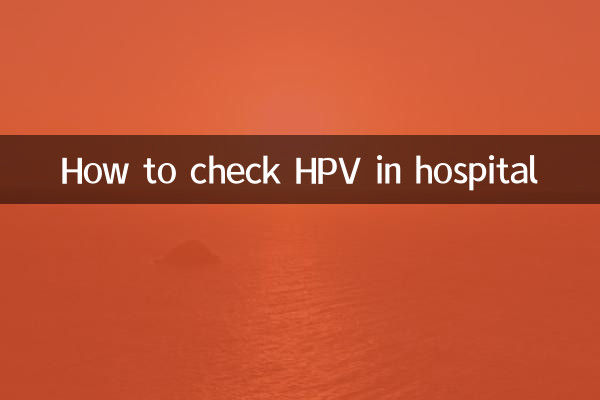How to check HPV in hospital
HPV (human papillomavirus) infection is one of the common sexually transmitted diseases. Persistent infection with high-risk HPV may lead to serious diseases such as cervical cancer. Regular HPV testing is key to prevention and early detection. This article will introduce in detail the process, methods and precautions for HPV examination in the hospital, and combine it with recent hot topics to help you better understand this health examination project.
1. Common methods of HPV testing

Commonly used HPV testing methods in hospitals mainly include the following:
| Check method | Applicable people | Check content | advantage |
|---|---|---|---|
| HPV DNA testing | Women over 25 years old | Detection of high-risk HPV viral DNA | High sensitivity for early detection of infection |
| TCT examination (liquid-based thin-layer cytology test) | Women over 21 years old | Detect cervical cell abnormalities | Can screen for cervical precancerous lesions |
| colposcopy | Those who are HPV positive or have abnormal TCT | Observe cervical and vaginal lesions | Intuitive and accurate |
| Biopsy | Those with high suspicion of disease | Removal of tissue for pathological analysis | gold standard for diagnosis |
2. The process of HPV examination
1.Register for appointment: Choose gynecology or obstetrics and gynecology clinics. Some hospitals provide special HPV screening services.
2.doctor consultation: The doctor will ask about medical history, sexual life history, etc. to assess the risk.
3.Sampling and inspection: The doctor uses a special brush to collect exfoliated cervical cells. The process takes about 1-2 minutes and may cause slight discomfort.
4.Submit for inspection: The sample is sent to the laboratory for testing, and results are usually available in 3-7 days.
5.Interpretation of results: The doctor will give suggestions based on the results, such as further examination or treatment options.
3. Precautions for HPV examination
1.Check time: Avoid menstrual period, the best time is 3-7 days after menstruation.
2.Preparation before inspection: Avoid sexual intercourse, vaginal douching or the use of drugs 24 hours before the examination.
3.Post-examination care: A few people may experience slight bleeding, which usually recovers on its own in 1-2 days.
4.Regular review: HPV-positive people need to follow the doctor’s advice for regular reexamination to monitor the virus status.
4. Recent hot topics related to HPV
1.Popularization of HPV vaccine: Free HPV vaccination programs have been launched in many places, covering women aged 9-45.
2.Controversy over male HPV screening: Experts call for men to be included in HPV screening to reduce the risk of transmission.
3.Home HPV Testing: Some e-commerce platforms have launched at-home HPV testing products, triggering discussions on convenience and accuracy.
5. Frequently Asked Questions about HPV Testing
| question | answer |
|---|---|
| Is the HPV test painful? | Mild discomfort, similar to menstrual period discomfort |
| Does being HPV positive definitely lead to cervical cancer? | Not necessarily, most infections can be cleared by the immune system |
| How much does an HPV test cost? | It ranges from 200 to 500 yuan, and can be reimbursed by medical insurance in some areas. |
| How often should you check for HPV? | It is generally recommended once every 3-5 years, more frequently for high-risk groups |
6. Summary
HPV examination is an important part of women's health management. Through standardized screening, risks can be detected early and intervened in time. With the advancement of medical technology, HPV testing is becoming more convenient and accurate. It is recommended that women of appropriate age undergo regular HPV examinations, combined with vaccination, to comprehensively prevent cervical cancer and other diseases. Recent discussions on the expansion of HPV screening and home testing also reflect the public’s increasing emphasis on health management.
If you have concerns about HPV infection or need to be tested, it is recommended to go to the gynecology department of a regular hospital as soon as possible. The doctor will develop a personalized screening plan based on your specific situation. Remember, prevention is better than cure, and regular check-ups are an important line of defense for your health.